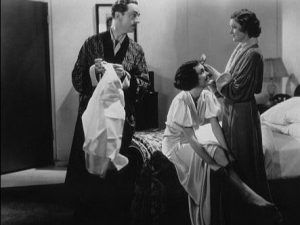
1934’s The Thin Man is a perfect film; not the greatest, nor even the most stylized, but simply executed without error. The actors especially the unbeatable team of William Powell and Myrna Loy are as good as I’ve ever seen, the script packed with wit and sly sophistication, and the ‘mystery,’ well, means absolutely nothing in the end, which is exactly as the filmmakers intended. Even Nick and Nora Charles, ‘retired’ from the sleuthing business, aren’t really that concerned with results or guilty parties; not when there are parties to throw, barbs to exchange, and martinis to consume. Nick’s joy in simply being alive (and drunk) is so damned infectious that we’re crushed with envy for not being able to share his company.
There’s nothing noble about him necessarily, so he’s free to wander about with more self-control than he has any right to expect from himself. And the relationship with his wife is nothing less than the most believable (and enchanting) in the long annals of the Hollywood romantic comedy. What they say to each other (and how they say it) goes beyond the mere recitation of dialogue; these are people we might have the good fortune of meeting in our daily lives, that is if we inhabited a world that valued erudition.
From the outset, it is impossible to believe that this is a film from 1934, as the characters and situations appear timeless, almost without regard for context. Director W.S. Van Dyke has no particular style he’s conveying (perhaps the result of a two week shooting schedule), other than to defer to the talents of his actors. And surely it helps to have a screenplay based on the work of Dashiell Hammett, who knew a thing or two about advanced wordplay in the face of intoxication.
The double entendres are thick and ultimately surprising, as it seems hard to believe that the prudish censors of the day let such winking remarks slide. Still, in many ways, as unforgivable as industry censorship is, the Production Code forced upon the writers of the day a clever subtlety that has been replaced by the overt idiocy of our own era.
Far from adhering to a Pollyannaish view of life, these are world-weary folks; only with the maturity to understand that in the midst of a Depression, all one can really do is shrug and toast the chaos. The world might be full of crime, greed, and unrepentant murder, but that shouldn’t stop one from playfully needling one’s wife.
When so many on-screen couples are unimaginative, dull, and little more than slaves to a childish script, Nick and Nora are an example of what we should all strive to be with our better half: sarcastic, sexual, flirtatious, and delightfully mean when the occasion calls for it (which is often). Most importantly, they avoid the gooey sentiment that can often be terminal in such films. Sure, they love each other deeply, but not so much that they won’t mutter a death threat from time to time. Or administer a ‘saving’ blow to the chops.
In reality as well as in spirit, this is a world where sleazy dames shack up with loutish boyfriends, wealthy widows push for a little more cash they don’t really need, and snotty children disregard their parents, but Nick and Nora stand above it all. They aren’t saints; simply two superior minds who long ago stopped dirtying their hands with day-to-day trivialities. Nick is even self-aware enough to know that he’s having a damn good time spending his wife’s fortune, and what’s more, he isn’t above telling her so.
Even the murder of the ‘thin man’ of the title, a decrepit scientist who’s part SOB, part bastard, is a mere ‘tidbit,’ as no one especially Nick and Nora really care about the victim. He’s simply a game to be played; a mysterious clue to spice up an evening. Nick’s big dinner with all the suspects, then, is mostly for his own amusement and only partly to discover the culprit. As such, Nick’s the sort of gentleman to be more concerned with the cut of his steak than the feelings of a grieving family. And that’s why we love him.